Origins of Thanksgiving and the History of Thanksgiving (the American Holiday)
A Lesson for English Learners
What are the origins of Thanksgiving? Find out in
this simple English lesson!
Thanksgiving is one of the most beloved holidays
celebrated in the United States. It is a time for families and
friends to gather, share a meal, and give thanks for all the
blessings in their lives. (The word "blessings"
means the good things in your life.)
Thanksgiving is celebrated on the fourth
Thursday of every November.
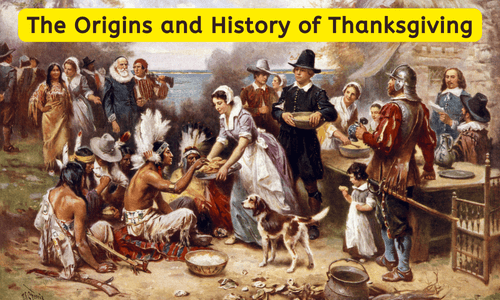
Lesson Table of Contents
1) Origins of Thanksgiving2) The Pilgrim Fathers, Mayflower Ship, and Plymouth Colony
3) The Wampanoag People
4) The First American Thanksgiving: 3 Days of Feast
5) 200+ Years of Thanksgiving as an Unofficial Holiday
6) The American Civil War: Thanksgiving Comes to Life
7) Sarah Josepha Hale, the "Mother of Thanksgiving"
8) Thanksgiving Today
9) Thanksgiving Vocabulary
10) A Short Story Dialogue to Demonstrate Some of the Thanksgiving Vocabulary
Origins of Thanksgiving
The origins of Thanksgiving can be traced back to the early 17th century when the Pilgrim Fathers came to America from England.The Pilgrim Fathers, Mayflower Ship, and Plymouth Colony
The Pilgrim Fathers (also called the Pilgrims) were a group of English people who left England in the 1600s. They were looking for a new place to live because they didn't like the way things were in England.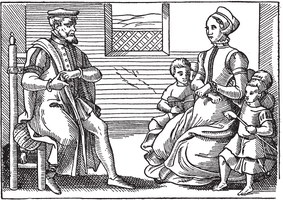
They sailed to America on a ship called the Mayflower,
and started a new colony there. They wanted to
start a new life in America. The word "pilgrim"
comes from the Latin word peregrinus, meaning "foreign".
A colony is a group of people from the same country living together in a new place.
A colony is a group of people from the same country living together in a new place.
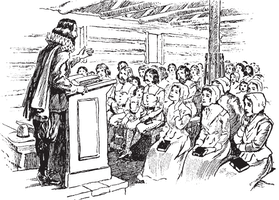
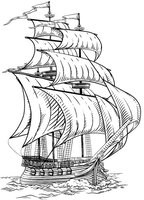
The Mayflower's voyage ( long
journey) took 66 days. On November 21, 1620, the ship arrived in
America with 102 passengers.
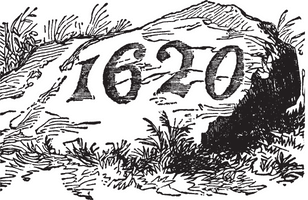
The Pilgrims were full of hope for a fresh start.
However, they quickly realized that they were ill-prepared
(not ready) for the challenges ahead (in their
future).
The weather was freezing, and their food supplies were running low. Many of them became ill.
By the spring of 1621, half of the group had passed away (died).
The Wampanoag is a group of people who originally lived that area of America. They were skilled at hunting and fishing. They also knew how to grow corn, beans, and squash.
The weather was freezing, and their food supplies were running low. Many of them became ill.
By the spring of 1621, half of the group had passed away (died).
The Wampanoag People
Despite these difficulties, the Pilgrims persevered (continued and did not let the problems stop them). With the help of their Native American neighbors (the Wampanoag), they learned to grow food.The Wampanoag is a group of people who originally lived that area of America. They were skilled at hunting and fishing. They also knew how to grow corn, beans, and squash.
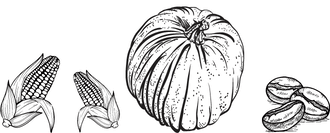
The Wampanoag chief (leader) made a peace treaty (agreement) with the Pilgrims that lasted for 4 decades (1621-1641).
The Wampanoag were generous to the Pilgrims,
teaching them important skills so that they could survive in the New
World (newly discovered America, in relation to the Old
World: Asia, Africa, and Europe).
The First American Thanksgiving: 3 Days of Feast
The harvest is the food that farmers grow. In the fall of 1621, the harvest was good, which means the Pilgrims had plenty of food.To celebrate their success, they organized a feast (a big meal) for about 50 Pilgrims.
The Wampanoag tribe heard about the feast and joined them (90 Wampanoag people). The Wampanoag brought five deer (a type of animal) for the feast.
The feast lasted for three days and included games, songs, and dancing. This celebration came to be known as the first American Thanksgiving.
Two years later, in 1623, the Pilgrims held their first religious Thanksgiving Day. After a two-month drought (a long time without rain) ended, the Pilgrims gave thanks to God for sending much-needed rain.
200+ Years of Thanksgiving as an Unofficial Holiday
For the next 238 years (from 1624 and 1862), from 1624 to 1862, Thanksgiving was celebrated primarily in the Northeast United States. The date varied from year to year and it was not an official nationwide holiday. Sometimes, it was not celebrated at all.The American Civil War: Thanksgiving Comes to Life
In 1863, the American Civil War (a war between the Northern and Southern US states) was raging (happening strongly). President Abraham Lincoln needed a way to unite (bring together) the country.
At that time, Sarah Josepha Hale,
an important writer, wrote to President Lincoln and suggested that
he create a national holiday for Thanksgiving.
Lincoln agreed and declared Thanksgiving an annual
national holiday. The new date for Thanksgiving was the fourth
Thursday of November, which is still the date it is celebrated
today.
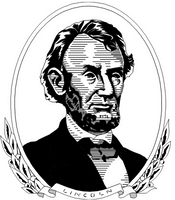
Sarah Josepha Hale, the "Mother of Thanksgiving"
Sarah Josepha Hale (1788–1879), a mother of five and a
widow, was the first female editor of a magazine in the United
States. She used her beautiful writing to promote the creation of
Thanksgiving as an official holiday. From 1846 till 1863 (17 years) she wrote letters to
leading politicians, urging (strongly encouraging)
them to declare the day of Thanksgiving a national holiday.
She was eventually successful in her mission,
and in 1863, in the middle of the Civil War, President Abraham
Lincoln signed into action "A National Day of Thanksgiving and
Praise".
The word "thanksgiving" means to give thanks, show appreciation. "Praise" means to express admiration for achievements.
This means that people who are afraid of failing are the ones who usually end up failing. If we prepare ourselves for anything that life throws at us, and dont be afraid of danger, then there is nothing we cant accomplish.
The word "thanksgiving" means to give thanks, show appreciation. "Praise" means to express admiration for achievements.
A famous quote by Sarah Josepha Hale, the "Mother of Thanksgiving":
"There is no
impossibility to him who stands prepared to conquer every hazard.
The fearful are the failing."
This means that people who are afraid of failing are the ones who usually end up failing. If we prepare ourselves for anything that life throws at us, and dont be afraid of danger, then there is nothing we cant accomplish.
Thanksgiving Today
Today, Thanksgiving Day continues to be celebrated in America as a way to give thanks and reflect on the good things in life. It is usually celebrated with a big family meal and activities such as football, parades, and Thanksgiving plays.
Thanksgiving Vocabulary
Abraham Lincoln: The 16th President of the United States, who declared Thanksgiving a national holiday in 1863.Accomplish: To succeed in doing something.
American Civil War: A war between the Northern and Southern US states from 1861 to 1865.
Blessings: Good things that happen to us.
Chief: The leader of a tribe.
Civil War: A war between two sides of the same country.
Colony: A group of people who leave their country to settle in a new land.
Conquer: To achieve victory over something.
Depart: To leave a place.
Drought: A long period of time
without rain.
Failing: Not succeeding.
Fearful: Feeling afraid or scared.
Feast: A large meal, usually for a special occasion.
Giving thanks: Showing appreciation and kindness for something.
Gratitude: Showing appreciation and thankfulness.
Harvest: The food that farmers grow.
Hazard: A risk or danger.
Failing: Not succeeding.
Fearful: Feeling afraid or scared.
Feast: A large meal, usually for a special occasion.
Giving thanks: Showing appreciation and kindness for something.
Gratitude: Showing appreciation and thankfulness.
Harvest: The food that farmers grow.
Hazard: A risk or danger.
Ill-prepared: Not well prepared.
Impossibility: Something that
cannot be done or achieved.
Ahead: In the future.
Mayflower: The ship that transported the Pilgrims to North America in 1620.
Mission: A goal that someone works hard to achieve.
Native Americans: The people who originally lived in North America.
New World: the newly discovered America, in relation to the "Old World", which was Asia, Africa, and Europe.
Mayflower: The ship that transported the Pilgrims to North America in 1620.
Mission: A goal that someone works hard to achieve.
Native Americans: The people who originally lived in North America.
New World: the newly discovered America, in relation to the "Old World", which was Asia, Africa, and Europe.
Passed away: a polite way to say
that someone died.
Plymouth Colony: A colony of
English settlers, founded in 1620 and located in modern-day
Massachusetts (a state in Northeastern United States).
Persevere: To continue an activity or task despite difficulties.
Persevere: To continue an activity or task despite difficulties.
Pilgrim Fathers (also called the Pilgrims):
The people who first settled in the Plymouth Colony in New England.
Praise: To express admiration for
achievements..
President: The leader of a country.
Raging: Happening with force.
Reflect: To think deeply or carefully about something.
Sarah Josepha Hale: An important writer and editor, credited with the creation of Thanksgiving as an official holiday.
Settle: To start living in a new place.
Settlers: People who leave their homes to start living in a new place.
Thanksgiving: A holiday celebrated annually in the United States, to give thanks and reflect on lifes blessings.
Treaty: An agreement between two or more people or groups.
Tribe: A very large group of related families, who live together in a certain area.
Unite: To bring people together.
President: The leader of a country.
Raging: Happening with force.
Reflect: To think deeply or carefully about something.
Sarah Josepha Hale: An important writer and editor, credited with the creation of Thanksgiving as an official holiday.
Settle: To start living in a new place.
Settlers: People who leave their homes to start living in a new place.
Thanksgiving: A holiday celebrated annually in the United States, to give thanks and reflect on lifes blessings.
Treaty: An agreement between two or more people or groups.
Tribe: A very large group of related families, who live together in a certain area.
Unite: To bring people together.
Urging: Strongly encouraging
someone to do something.
Voyage: A long journey by sea or
air.
Wampanoag: One of the tribes who
originally lived in North America.
Bob: "Lets give thanks for all of our blessings!
Im so thankful to have such good friends in my life."
Samantha: "Agreed! We should all be thankful for the hard work that Sarah Josepha Hale went through to unite us and make Thanksgiving an official holiday."
John: "Indeed. We should also be thankful for the Wampanoag people, who taught the Pilgrim Fathers how to survive in the New World."
Bob: "And lets not forget Abraham Lincoln and his actions to make sure Thanksgiving was celebrated every year."
Samantha: "The American Civil War was raging at the time, but we persevered, and now we can celebrate this day every year."
John: "Lets all join hands and reflect on the true meaning of Thanksgiving."
Bob: "Amen!"
A
Short Story Dialogue to Demonstrate Some of the Thanksgiving
Vocabulary
Bob: "Lets give thanks for all of our blessings!
Im so thankful to have such good friends in my life."Samantha: "Agreed! We should all be thankful for the hard work that Sarah Josepha Hale went through to unite us and make Thanksgiving an official holiday."
John: "Indeed. We should also be thankful for the Wampanoag people, who taught the Pilgrim Fathers how to survive in the New World."
Bob: "And lets not forget Abraham Lincoln and his actions to make sure Thanksgiving was celebrated every year."
Samantha: "The American Civil War was raging at the time, but we persevered, and now we can celebrate this day every year."
John: "Lets all join hands and reflect on the true meaning of Thanksgiving."
Bob: "Amen!"
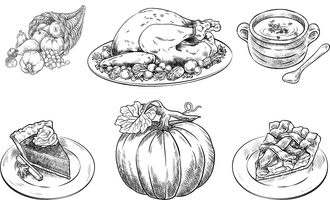
We hope this lesson has provided you with a deeper
understanding of the origins and history of Thanksgiving.
Get Updates, Special Offers, and English Resources
Download your FREE GIFT (the first two chapters of
English Short Stories Book and Workbook)
as soon as you join!

By submitting your email, you consent to receiving updates and newsletters from us and to the sharing of your personal data with third parties for the purposes of sending you communications. We will not spam you. You can unsubscribe at any time. For more information, please see our privacy policy.





